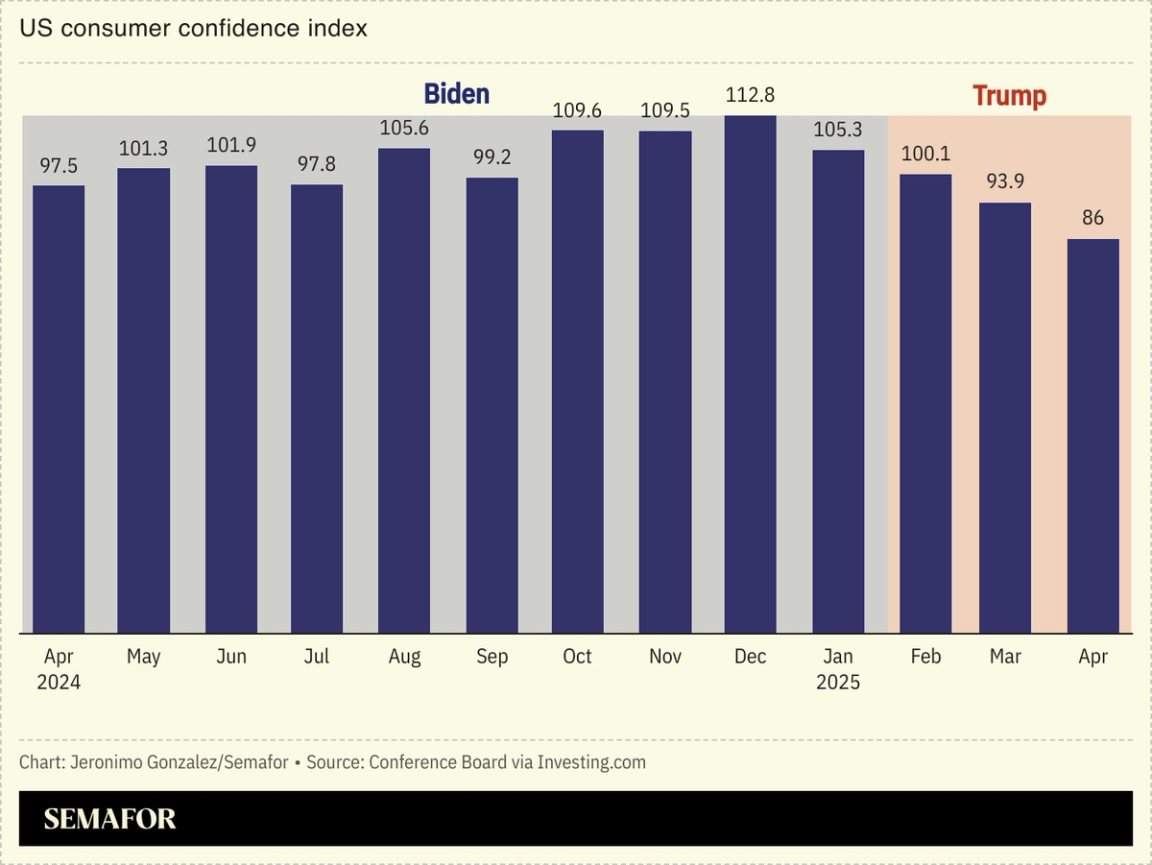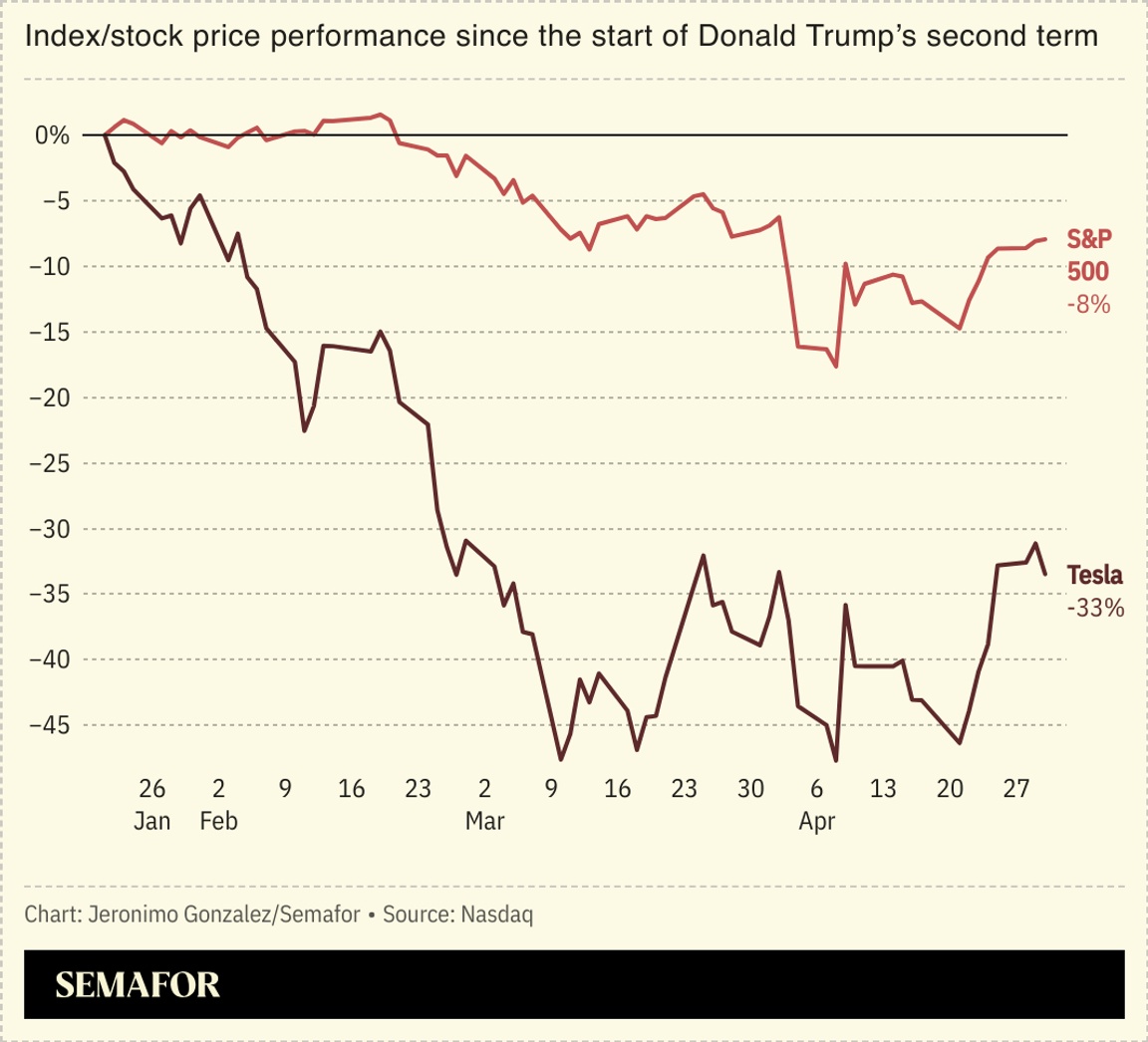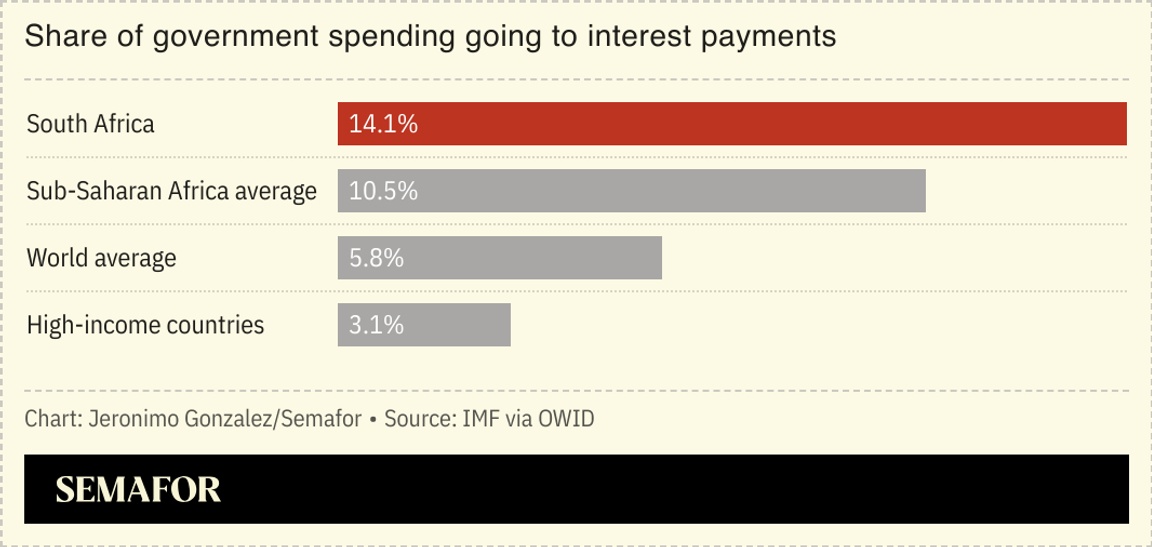| | Trump admits his tariffs may hurt the US consumer and the Republican Party, Kyiv may have played its͏ ͏ ͏ ͏ ͏ ͏ |
| |   Bogotá Bogotá |   Shetland Islands Shetland Islands |   Copenhagen Copenhagen |
 | Flagship |  |
| |
|
The World Today |  - Trump: Tariffs will hurt
- US-China trade talks
- Europe’s US boycotts
- Kyiv’s tough mineral deal
- Legal setback for Apple
- Tesla looking beyond Musk?
- Meeting US power demand
- SAfrica tries budget again
- Colombia’s online cartels
- Mosquitoes in Scotland
 Staggering food price rises in Gaza, and recommending a restaurant in La Paz. |
|
Trump defiant on trade risks |
 US President Donald Trump acknowledged his trade war carried economic and political risks, but insisted they were necessary to “save the country.” Noting fears of supply shortages and steep price rises resulting from his tariffs, Trump told his cabinet that “maybe the children will have two dolls instead of 30 dolls” at Christmas and “maybe the two dolls will cost a couple bucks more.” He also admitted that his tariff program could cause Republicans to lose control of Congress. Analysts voiced worry over the hit to the US economy: “Things might be pretty fine in aggregate,” Bloomberg’s Odd Lots newsletter warned, “but once you start delving into consumer stats you can find pockets of weakness pretty quickly.” |
|
US, China signal openness |
|
Europe’s US boycott gathers pace |
 European boycotts of US goods — though still small — are gathering pace as a result of fury over Washington’s policies. US President Donald Trump has imposed tariffs on the European Union, belittled the continent’s defense efforts, and launched a crackdown against migrants, “causing European consumers to think twice about what’s in their shopping cart” and potentially signaling a “long-term structural shift… away from US products and brands,” European Central Bank economists wrote in a blog post. Already, Danish consumers are boycotting Coca-Cola, the drink’s bottler in the country has said, while visitor arrivals to the US from Western Europe have fallen sharply and Tesla’s sales have plummeted. Europeans aren’t alone in eschewing US goods: Canadians are, too. |
|
Ukraine minerals deal ‘relief’ |
 Brian Snyder/File Photo/Reuters Brian Snyder/File Photo/ReutersA long-awaited minerals-for-security deal between the US and Ukraine allows Kyiv to breathe “a rare sigh of relief,” analysts said. While the terms are onerous for Ukraine, the pact shows “seriously tough negotiating” on the part of President Volodymyr Zelenskyy, an Atlantic Council expert said, and opens the door to new military assistance. It comes as ceasefire talks over the three-year war founder, with US President Donald Trump voicing growing frustration with Moscow’s apparent slow-walking. The US may not be getting as good a deal as it thinks when it comes to the deal with Kyiv, though: “Ukraine’s government essentially invented its mineral riches to give itself a card to deal with Trump,” one expert said in The Strategist. |
|
Apple hit with App Store ruling |
 Lucas Jackson/File Photo/Reuters Lucas Jackson/File Photo/ReutersApple was banned from charging US customers commission on purchases via third-party apps and from making it difficult to buy from other stores. The order by a district judge represents a major defeat in the tech giant’s dispute with Epic Games, the developer of Fortnite, which said Apple was illegally restricting competition. Apple takes up to 30% on purchases in its apps: A 2021 ruling said it had to allow developers to provide alternatives, but Apple instituted a commission on those purchases too. The judge in the Epic case said the company had “wilfully” disobeyed her, and warned it may face criminal contempt proceedings. It follows a European Union ruling forcing Apple to open its app ecosystem to other developers. |
|
Tesla weighing new CEO: WSJ |
 Tesla reportedly began a search for a new CEO to replace Elon Musk, as its stock price sinks and profits fall. Shareholders are unhappy with Musk’s focus on his government cost-cutting role, The Wall Street Journal reported, and the carmaker faces challenges: First-quarter profits were down 71% year-on-year, and Chinese rival BYD has overtaken it in sales. Musk’s political stances have made Tesla unpopular among predominantly left-leaning electric vehicle customers, while tariffs have raised costs. The board said it remained “highly confident” in Musk, but Tesla may be in worse shape than headline numbers suggest: The Trump administration wants to cut regulatory EV credits, which are keeping Tesla in the black as it is losing money on car sales. |
|
 ECMWF Flickr Creative Commons Photo. ECMWF Flickr Creative Commons Photo.Fears that the skyrocketing use of artificial intelligence will cause global electricity shortages are overblown, analysts argued. While AI is extremely energy-intensive, PwC analysis suggested that if the technology improved energy efficiency across the economy at a tenth of its rate of adoption, AI would roughly offset its increased power demands. IEEE Spectrum’s power and energy editor, meanwhile, noted that in the US, history shows that “innovations in efficiency continually compensate for relentless technological progress.” They will need to: A report last month from the International Energy Agency forecast that electricity demand from data centers would more than double by 2030, requiring more power than all of Japan does today. |
|
SAfrica targets debt repayments |
 South Africa’s finance minister will present a new budget this month in a bid to stabilize Pretoria’s soaring debt repayments. The announcement came just weeks after the last, ill-fated budget threatened to break up the governing coalition. Last year, South Africa’s debt exceeded 100% of GDP, a level similar to high-income countries. Pretoria, however, pays higher interest rates than those nations — a pattern seen across much of sub-Saharan Africa — which has led to it allocate more than 14% of government spending to service its debt. “South Africa’s debt crisis is often attributed to excessive borrowing,” experts at a South African think tank wrote. “But the real issue lies in the cost of debt, not its size.” |
|
Latam gangs’ online recruitment |
 Latin America News Agency via Reuters Latin America News Agency via ReutersRebels in Colombia are recruiting youths through social media, urging thousands to enlist as conflict threatens to destabilize the country’s fragile peace. Ongoing fighting has killed dozens and displaced tens of thousands this year. According to a UN report, the armed groups use platforms such as TikTok and Facebook to glamorize life in their ranks, a big draw in a country where youth unemployment sits close to 20% and where formal employment opportunities are hard to come by. Mexican cartels have similarly leveraged social media to bolster their ranks: The Sinaloa and Jalisco New Generation cartels have dozens of social media accounts dedicated to recruitment. In Mexico, “TikTok isn’t just entertainment,” experts wrote in a recent study. |
|
|